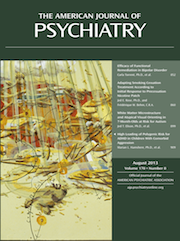The Role of the Major Histocompatibility Complex Region in Cognition and Brain Structure: A Schizophrenia GWAS Follow-Up
Abstract
Objective
The authors investigated the effects of recently identified genome-wide significant schizophrenia genetic risk variants on cognition and brain structure.
Method
A panel of six single-nucleotide polymorphisms (SNPs) was selected to represent genome-wide significant loci from three recent genome-wide association studies (GWAS) for schizophrenia and was tested for association with cognitive measures in 346 patients with schizophrenia and 2,342 healthy comparison subjects. Nominally significant results were evaluated for replication in an independent case-control sample. For SNPs showing evidence of association with cognition, associations with brain structural volumes were investigated in a large independent healthy comparison sample.
Results
Five of the six SNPs showed no significant association with any cognitive measure. One marker in the major histocompatibility complex (MHC) region, rs6904071, showed independent, replicated evidence of association with delayed episodic memory and was significant when both samples were combined. In the combined sample of up to 3,100 individuals, this SNP was associated with widespread effects across cognitive domains, although these additional associations were no longer significant after adjusting for delayed episodic memory. In the large independent structural imaging sample, the same SNP was also associated with decreased hippocampal volume.
Conclusions
The authors identified a SNP in the MHC region that was associated with cognitive performance in patients with schizophrenia and healthy comparison subjects. This SNP, rs6904071, showed a replicated association with episodic memory and hippocampal volume. These findings implicate the MHC region in hippocampal structure and functioning, consistent with the role of MHC proteins in synaptic development and function. Follow-up of these results has the potential to provide insights into the pathophysiology of schizophrenia and cognition.



